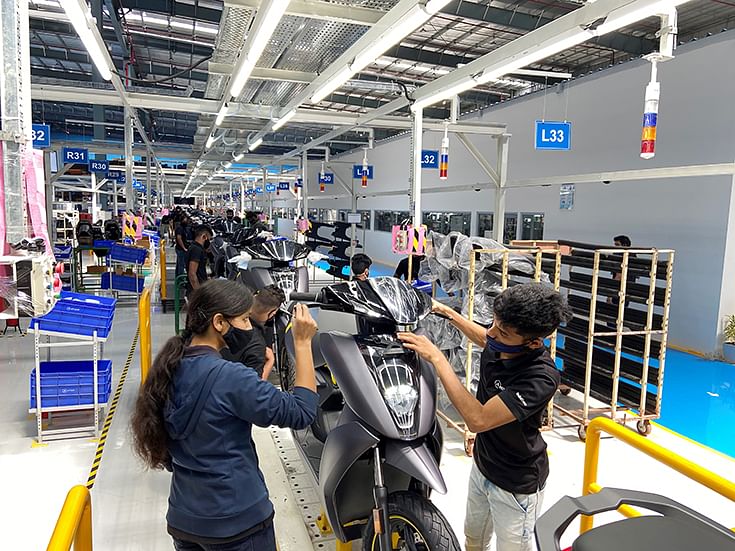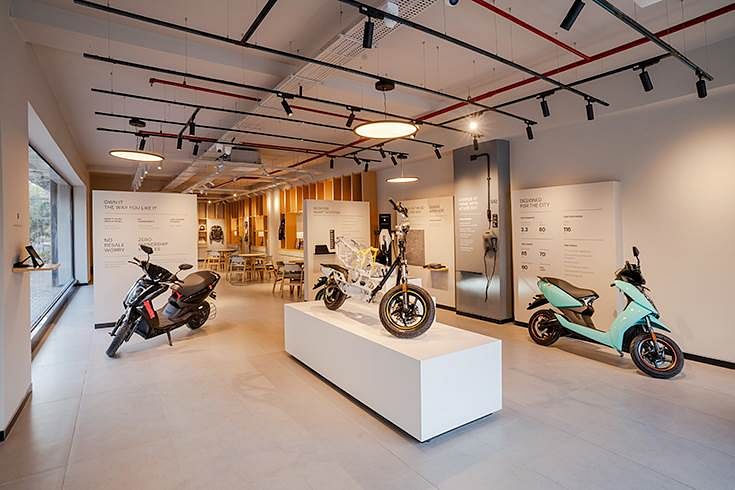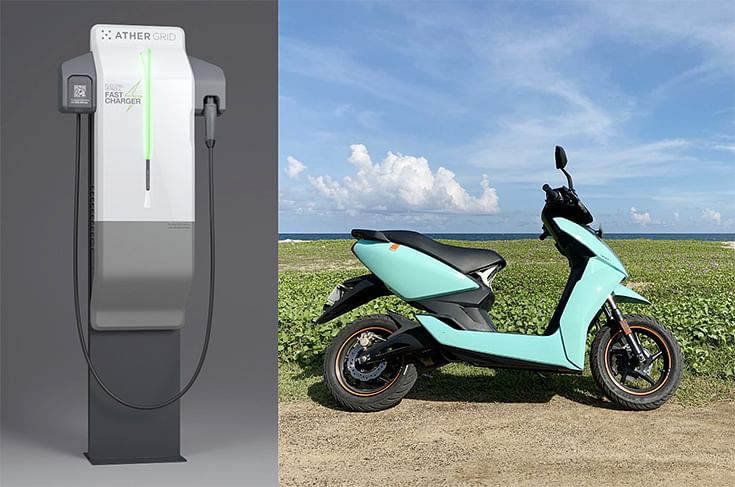Ather Energy’s Ravneet Phokela: ‘The EV market will bounce back even if subsidies are reduced’
In an effort to be future-ready, smart electric scooter manufacturer Ather Energy is expanding capacity three-fold to 400,000 units. Chief Business Officer Ravneet Phokela tells Mayank Dhingra that the EV industry’s fundamentals are strong and consumer acceptance is getting stronger.
Ather Energy has recently announced capacity expansion at the Hosur plant. Is market demand genuine or are subsidies giving tailwinds to EV sales?
Subsidies and demand are not mutually exclusive. Incentives at this point in time do provide a trigger to the fence-sitters or people who haven’t really made up their minds about going electric. But the reality is that we don’t believe we would be at the mercy of subsidies forever. There are tail-winds, and even before the subsidies kicked in, we were seeing good traction in the electric two-wheeler space.
While subsidies have accelerated the growth and excitement, fundamentally there are strong tail-winds from a consumer acceptance and awareness perspective, which should tide us through. So, subsidies are definitely helping in the short-term, but the long-term is not dependent upon them.
Does the industry fear overcapacity if demand tapers off once subsidies are removed?
Demand might taper off when subsidies are removed, but that would be relative to the demand when subsidies were in place. However, in an absolute level, the demand will certainly not tank.
The reason everybody is investing into capacity, be it a new or a legacy player in the EV segment, is because there is a strong belief in the future, based on what we understand from the market, industry and government.

When a company sets up a factory, it’s a big decision which is irreversible. These are very important decisions which OEMs take a long time to commit to, and expansion at this point is a testimony to the fact that we don’t see demand coming down absolutely. There might be a blip or two whenever subsidies are reduced, but the market will bounce back.
Do you have a Plan B to hedge the business to counter the lack of subsidies in future?
We don’t factor in subsidies in the long-term plan anyway, and anybody who does that is playing a very dangerous game. We assume that subsidies would taper off eventually and, at that point in time, if the business isn’t able to sustain itself in terms of the cost and price, then clearly, you’re in the wrong business.
Was the capacity expansion already planned for 2022 or is it a result of a spike in demand?
While we had planned the expansion for later, the pace of growth and market demand has taken us by a surprise. We moved to the Hosur factory in end-December 2020, and we have already signed up for expansion within a year.
So, clearly, the demand has surpassed our expectations, wherein one would normally stick to a newly installed capacity for a timeframe of at least two to two-and-a-half-years. We honestly didn’t see the demand coming and it just fast-tracked our plans. We have bought an adjoining land parcel next to the current facility, so it’s going to be in the same complex.
What investments has Ather made to expand capacity from 120,000 to 400,000 units at Hosur? Will funding continue?
We have committed capex in the range of Rs 635-Rs 650 crore over the next few years for expansion and this announcement is part of that overall plan. The funding will continue — it’s a way of life.

While we turned unit-level positive a few months ago, in terms of company-level profitability, there’s going to be another 18-24 months still. Having said that, the business is growing faster than we anticipated six months back, so there is certainly going to be more capital infusion to accelerate our decisions planned for longer. These investments, however, are not going to be directly related to expansion.
Could Omicron pose a challenge in capacity expansion? Do you also foresee supply chain constraints?
When we set up the Hosur facility last year, it was bang in the middle of Covid when the entire world wasn’t prepared to live with the virus. Today, we have all learnt to live with it. So, I think we are in a significantly better position to deal with any issues than we were last year.
Unlike supply chain, building a manufacturing capacity, whether it is for vehicles or batteries, is in our control and that is what we are scaling up for. Moreover, setting up a facility is a long lead-time activity, so we want to make sure that even if we are a few months ahead of the supply chain, it isn’t going to be a big problem. Supply chain disruption at this moment is a short-term problem which we hope will sort itself out over the next few quarters.
With the Rs 76,000 crore PLI scheme for semiconductors, will we now see establishment of a domestic chip industry?
While there are investments being committed into this industry, it wasn’t the case that there was lack of capital that refrained people from investing into the semiconductor space earlier. The reason China has a very large semiconductor industry is because China assembles for the world and there is captive demand within the country, which de-risks the entire operation.
For someone to set up a semiconductor manufacturing facility in India, there has to be some level of comfort in terms of local demand, and that’s where the larger vision of India becoming a manufacturing hub becomes important, whether the end product is sold within the country or exported.
To start somewhere off, I think it’s a great start with the incentives coming in but from a long-term perspective, unless we find opportunities to ensure a certain threshold of domestic demand, these industries may find a little difficult to make deep investments. And that is the reason why the entire push for EVs becomes extremely important as if we reach, for instance, 50 percent electrification in the two-wheeler segment over the next five years, at least we have that level of captive demand in India.
When do you anticipate possibility of local sourcing of battery cells for EVs in India?
If we go by the conversations with the NITI Aayog, DHI and other industry forums, it would be fair to assume that over the next 3-5 years, we should start looking at some local production kicking in. The only silver lining is that given the nature of the battery industry and the scale, investments and capabilities it requires, only big players will jump in. And once big players come in, the risk of time overruns becomes slightly reduced. I am fairly optimistic about the 3-5-year horizon.

Do you see increasing competition from players like Ola Electric as a threat to Ather’s positioning?
With EVs currently accounting for just one percent of the overall two-wheeler market, there is so much headroom for everybody to grow in this space that I don’t think there’s need to worry about competition.
Moreover, we have a strong product with a strong market fit. Importantly, what people also underestimate is that just having a stable platform and supply chain at this stage is a huge source of strength. These are things that cannot be fast-tracked; they only take that much time.
So, the investments we have made over the last few years into product, R&D and supply chain are going to help us scale to the level we intend to.
This interview has been first published in Autocar Professional's December 15-2021 magazine edition
RELATED ARTICLES
INTERVIEW: "EV Demand is Rebounding both in India and Around the Globe" - JLR's Rajan Amba
Jaguar Land Rover India MD Rajan Amba discusses the India–UK FTA, the company’s manufacturing plans, the upcoming Panapa...
TVS Celebrates 20 Years of Apache, Eyes Premium and Global Push
Marking two decades of its flagship performance brand, TVS Motor unveiled special anniversary editions on Saturday while...
Q&A: Mahindra's Nalinikanth Gollagunta on Upcoming Festive Season, 'Bold' Design Choices
Automotive Division CEO Nalinikanth Gollagunta says mid-teens growth is achievable with Roxx ramp-up, BEVs, and a resil...






 30 Dec 2021
30 Dec 2021
 11001 Views
11001 Views





 Prerna Lidhoo
Prerna Lidhoo


 Darshan Nakhwa
Darshan Nakhwa


